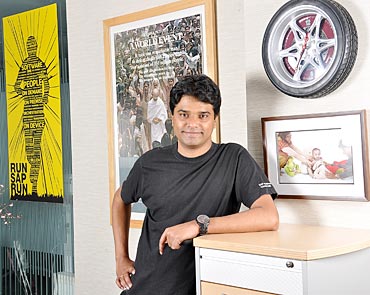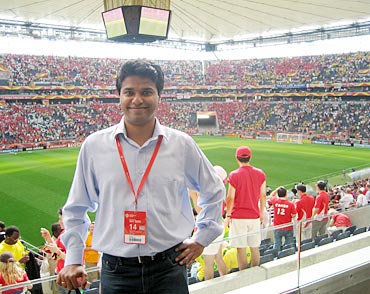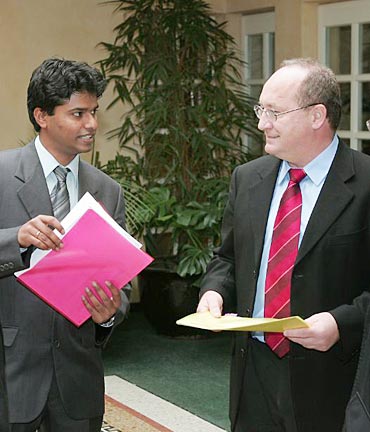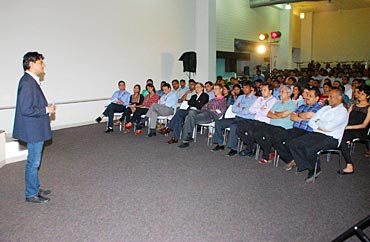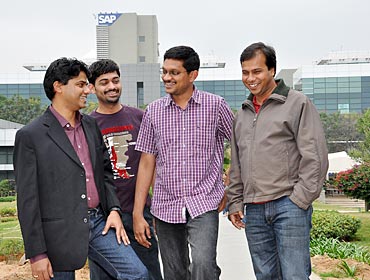 | « Back to article | Print this article |
How this IT misfit became the MD of an MNC
Just about a few months into his first job he was told by his manager he was not fit to be in the IT industry. 11 years later he became one of the youngest managing directors at German multinational SAP Labs India.
That, in a nutshell, is the story of 37-year-old V R Ferose who has been at the helm of SAP Labs India since April 2010.
Interestingly, when his manager at Ramco Systems, which he joined after being selected in a campus interview, rebuked Ferose he was not heartbroken. "I think in many ways that was a positive dissatisfaction," he remembers.
"I didn't want to prove him (my manager) wrong but I wanted to prove to myself that I was not so bad in what I was doing," he quickly adds.
This episode, in a way, reflects the value system that Ferose learnt from his parents -- his father was a low-ranking railway employee when he joined the Indian Railways but rose through the ranks because of his hard work, honesty and commitment, and his mother taught him the importance of networking with people -- that has helped him scale challenges that came along the way.
Apart from these, Ferose also cherishes the values he imbibed by virtue of having spent his formative years in Kerala and West Bengal.
"Whether it is literature, theatre, sports, debating and soccer I have had a passion for these things because of my growing up in Bengal and my roots in Kerala," says Ferose who was born in Kerala and brought up in West Bengal.
Apart from being two of India's states where communism played a significant role in shaping the social, political and cultural life of society, Kerala and West Bengal are also famous for their soccer clubs.
Soccer mania grew on Ferose and by 1986 he was sure he wanted to become Deigo Maradona in his own league. While he couldn't emulate the Argentine superhero who helped his country reach the finals and win of the 1986 FIFA World Cup, Ferose's skills in toying with the soccer ball has helped him play for SAP Labs India as a forward and also learn valuable corporate lessons.
"Even the soccer field has lot of insights to offer to a corporate leader," says Ferose who emulates strategies employed as a forward on the field in fulfilling his role as the managing director of SAP Labs India.
Prasanna D Zore spoke with Ferose to learn more about the lessons he learnt in his life, his success mantras and his journey from being a developer in SAP Labs India to becoming its managing director.
Click NEXT for more
'Soccer is a team game at the end of the day and no individual is above her/his team'
Tell us something about your childhood days and the values your parents inculcated in you
I was born in Kerala but brought up in Bengal. So I keep joking that I grew up in two states that were ruled by the communists. But I am not communist in my thinking. Nevertheless, these two states are phenomenal places to grow up in and I consider myself more Bengali than Malayali having spent almost 10 years of my life in Kharagpur.
But what really built me in my growing up days was the fact that I was exposed to a very good environment of high culture: Whether it's literature, theatre, sports, debating and soccer. I have had a passion for these things because of my growing up in Bengal and my roots in Kerala.
My father came from a middle class background -- I am still from a middle class family and having worked with the Indian Railways there were two fundamental values that I learnt from him in my childhood days. One is the high sense of honesty and commitment to the job. I saw my father progress from the lowest ranks in the IR to go on to win the Railways Gold Award which is the highest award given to any person in Railways. I saw my father progress with an extreme sense of honesty and commitment to his job and that has had a deep influence on my own value system in the corporate world.
My mother was a great host. My father would always have a number of guests at our home and my mother would do all the cooking. Jokes apart she taught me how important it was to be close to people from high or low background and listen to them. This has helped me become a people's manager.
What corporate lessons does playing soccer at the forward position teach you?
I play soccer as a forward and I started a soccer interest group in SAP when I was a developer with SAP in 1999. We have a proper soccer group today and we won the corporate soccer tournament last year. We also played soccer in Germany where top 100 teams come and play what we call as SAP Cup.
I grew up watching Maradona (Argentine captain Deigo Maradona who played a stellar role in his country defeating the West Germans in the 1986 soccer World Cup) win the 1986 World Cup and ever since had nursed a dream that one day I will grow up and be Maradona in my own league. But what soccer as a sport has taught me is that it is a team game at the end of the day and no individual is above her/his team. One may play at the forward position and be the one who typically scores a goal but there is a lot that the rest of the team contributes by feeding the ball to the forwards who score goals.
I call the rest of the soccer players as non-strikers. Soccer taught me that there is space for non-strikers as they are the ones who set it up for strikers who ultimately get into the limelight. The non-strikers too are an integral part of a team's success.
The same set of fundamental values hold true in the corporate world. I may be the MD who is the face of the company but believe me there are hundreds and thousands of people who help make SAP a success that it is today.
Click NEXT for more
'Looking back I think I haven't done too badly yet'
You did your engineering from NIT Warangal. Could you take us through your career growth from NIT Warangal as an engineering graduate to being the managing director of SAP Labs India?
My elder brother -- five years older to me -- studied from IIT Kharagpur. Unfortunately, there is a lot of pressure when there are two brothers and one of them is an IITian. My parents always assumed that I would get into IIT as well. I tried twice but never got through it. However, I managed to get into NIT Warangal through the state entrance exam. So I opted for computer science at NIT Warangal in 1993 and finished my BTech in 1997.
I got selected through campus interview in Ramco Systems in Chennai which was also an ERP (enterprise resource planning) company. I joined Ramco Systems sometime in July 1997 and worked there for two years. And I must admit that I was not necessarily a great performer. In fact my manager in Ramco Systems told me that I was not fit to be in the IT industry. I wasn't too good at it and I am not blaming my manager at all.
I was young and I thought I could change the world, I could get along without being a great professional but I think in many ways that was a positive dissatisfaction. I had a phase of positive dissatisfaction where my manager felt that I was not good enough to be in the IT industry and I didn't want to prove him wrong but I wanted to prove to myself that I was not so bad in what I was doing.
Looking back I think I haven't done too badly yet.
After spending two years with Ramco I joined SAP as a developer, the entry level for any engineer who joins SAP Labs. In August last year I completed 11 years in SAP Labs. I have been extremely fortunate to get some of the opportunities and when I look back I think there were two or three areas where my career took off exponentially.
One was when I became one of the youngest managers in SAP at 26-27. But becoming a manager was not good enough. I had a point to prove to myself -- I was rated as one of the best managers from amongst 80 people -- and when I got an opportunity to work as an executive assistant to SAP board member towards 2005 I worked hard to prove myself. I became the first Indian ever to work as an executive assistant to a SAP board member and believe me it was a tough job.
The way it works is like this: We have some 6 board members and every board member has two executive assistants. These people are handpicked by the company and are looked up to as future leaders. You have to be in that role for two years. You have to shadow the board member; it is a high-pressure role, an amazing experience and it is a great training ground for future leaders. But almost 50 per cent of the people don't survive these two years as executive assistants. It is extremely strenuous, long days, lot of travelling. But still it is a great opportunity and I was very fortunate to get it and I made the most of it.
Interestingly, I survived this period well and immediately after finishing this role I was given the charter to become the managing director for SAP Labs in Gurgaon. I was 33 then and the first non-German MD of SAP Labs in its history (all previous MDs before Ferose were expats).
I was also the youngest MD of a global firm. But at that time I was the MD of only one lab in Gurgaon. Last year I was promoted as the head of entire SAP Labs in India and today I am senior vice president and MD of SAP Labs India.
Click NEXT for more
'One of the most important things in the corporate world is to know how to get things done'
What kind of challenges did you face in your career and how did you tackle them?
If you ask me every role came with its own challenges. When I was given this responsibility last April to head the entire SAP Labs in India it was the biggest challenge. It was not just about running operations. I was given the charter to transform SAP Labs in India. I had to fundamentally move the needle in 18 months and take the Labs to the next level of development. I am into the 15th month and I must tell you it is a great learning and humbling experience for me and we have moved the needle tremendously from where we were last April.
Earlier I was running a lab with 500 people (in Gurgaon) and now I had to transform a company with almost 4,000 employees. It is like moving a large elephant but while doing so you have to be very careful. If you take a sudden U-turn it can topple off and so one has to move in a particular direction one degree at a time and not make it so fast that people cannot handle it.
Tell us about the virtue of being patient in progressing in one's career. You have been with SAP Labs India since 1999... many in the current lot amongst India's youth keep hopping from one job to another in search of quick growth and better opportunities...
If you ask anybody (at SAP Labs) how would you like to define Ferose as, the one thing they will never associate me with is patience. I am supposedly the most impatient man around. The reason why I have stuck with SAP for 12 years is because I got to do different roles every two years. Every two years I got an opportunity to change my roles and responsibilities. And I have always said this that I have not looked out for opportunities but opportunities have looked out for me.
Every time I felt I have reached the best of what I could do the company always gave me a new challenge. And I being a young MD is the testimony of how great a company SAP Labs India is. I could reach this stage because of the opportunities that the company provided to me and put its trust in me.
One of the most important things in the corporate world is to know how to get things done. And I believe that execution becomes your number one task as the head of your company. And it's important to follow through till you have finished the job at hand.
Click NEXT for more
'You have to be always modest about yourself but ambitious for the company'
Your success mantras and values you have followed in your life...
First, be brutally honest. I use the word brutally because in corporate world we are in I think everybody knows everything. People see through you very, very quickly. At any point you cannot afford not telling the truth.
Secondly, I have recognised the power of networking and the power of being with people and listening to them.
Even now, once a week, I have lunch with 10 random employees, typically from all levels of the company. That is the best way to connect with what is happening at the lowest level in the company. Being in my position, a lot of what I come to hear from people who I speak with is not necessarily always the truth. One tends to tell me only what I want to hear.
Having risen through the ranks in the company I happen to know 50 to 70 per cent of the organisation anyways. So people often tell the truth to me. Being in touch with the people at all levels in the company makes a huge difference.
The third most important thing is I have always believed in thinking big. I never believed in incremental improvements. I have always said let us look at doing big and audacious things. I always think of 100 per cent improvement over whatever we have to change. Being able to think and then being able to articulate and execute it is one of the most important characteristics of a successful leader. And I have always thought big for my company.
But as they say you have to be always modest about yourself but ambitious for the company.
Click NEXT for more
'Children when exposed to music and sports grow up being a lot more confident'
Your plans for SAP Labs India for the next five years...
First and foremost we want to be the employer of choice. We also want to become the best innovation centre in terms of the greatest products we develop.
But being an employer of choice we don't mean that we want to be a great place to work and hang around but also work on the latest, cutting-edge technology and we need to have pour iPad movement, if you may call it so, to make one great product from India for the rest of the world.
We are not talking about building products from India for India but I want to build products from India for the rest of the world.
Interestingly, in the next few months we will be releasing a couple of products, which we are very, very confident and bullish about. We have 54 lines of businesses with 4,000 people and day in and day out we work on at least 100 products.
What's your message for India's young?
The most important thing is the young needs to be ambitious. But as I always say you need to have passion with a sense of compassion. Our youth today has to have a sense of giving. A lot of times we sit in this mad world of only taking things. But it's time we start a culture of giving.
I was bought up in a value system where giving was very central to whatever we did. Even if one earns a meagre income s/he can still give a small amount out of it for a cause. I have seen my parents give money to our maids to educate their children and help them get married.
How do you practice what you preach?
Officially, I am working with four NGOs very closely and am on the board of two of them. Personally, along with Dr Kiran Bedi who graciously helped with space to run the school, I have opened a music school for the underprivileged children in Gurgaon. I believe, again through my own upbringing, that if you are able to expose children to music and sports they grow up being a lot more confident. It is not just the basic school education we need.
The idea of this music school is to find talented children, nurture them and at the end of it even if they don't become successful musicians they are much more confident and well-rounded individuals.
